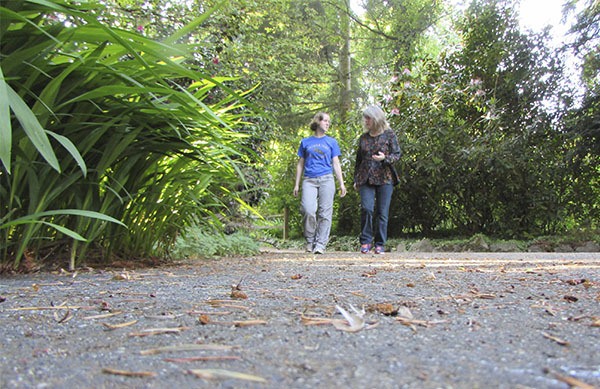Two Bainbridge Island women will lace up their shoes for the walk of a lifetime.
Sally Noedel and her daughter, Emma Bigongiari, will journey nearly 1,500 miles from Bainbridge Island to Arizona to raise awareness about a proposed copper mine in Oak Flat, Arizona.
If built, the mine would cut off access to sacred lands where the San Carlos Apache tribe practices religious ceremonies. Oak Flat is considered an important part of the San Carlos Apache tribe’s religious customs and traditions.
“It’s good to say this is like a church,” said Noedel of the forest land, which is currently open to the public. “There’s no building, but that’s not the way their religion is observed.
“We are not speaking for the Apache people,” she added. “We just see a great injustice here and a great ecological travesty unfolding.”
The idea of copper mining didn’t sit well with Noedel — a lifelong nature lover — and her daughter didn’t like the idea, either. The two didn’t want to stand by and watch a spiritual place destroyed, along with its environment.
So, they decided to protest and raise awareness by taking a walk.
A very long walk.
“It’s a beautiful place. It’s a national forest and it’s a place we’re supposed to share,” said Noedel. “From an environmental standpoint, we have time to save this one.”
They depart at 9 a.m. Friday, May 29 from Bay Hay & Feed and invite others to join them for the first steps. They expect to average between 20 and 30 miles per day, and together, mother and daughter have been practicing walking around the island every morning.
During what will likely turn out to be the most intense walk of their lives, they do plan to rest their feet. Throughout the route, one will drive a car for a few miles while the other walks. Then, they’ll switch to take breaks. Both expect it will be a time to meditate and reflect. It will also draw even more attention to the cause.
“We want to meet people along the way. Our main goal is awareness. As we walk through different towns, we want to talk to everyone,” said Bigongiari, who said they’ll ask residents to contact Congress to stop the mining project. “We just think it will reach the highest number of people to walk there.”
Two months ago, the women discussed the news of sacred tribe land being traded so a large mining conglomerate could start working to pull copper from nearly 7,000 feet deep into the earth. They wanted to take action to let others know of the minimally publicized plan.
In December, Congress buried the details of a land exchange in the National Defense Authorization Act for fiscal year 2015 after it failed at the legislative level twice last year. In it, the Southeast Arizona Land Exchange and Conservation piece outlines the exchange of 2,422 acres of federally owned land (Tonto National Forest) for 5,300 acres of land owned by Resolution Copper.
Tonto National Forest — property of the USDA National Forest Service — is where Oak Flat lies, and is currently an open recreational area to campers, climbers and other outdoor enthusiasts.
Once Resolution Copper Mining moves in, the San Carlos Apache tribe will lose access to Oak Flat, which is where the mining company will extract billions of pounds of copper, forever altering the environment.
According to Resolution Copper Mining’s website, the project will be the largest copper producer in North America by mid-2020. It’s also expected to bring in $61.4 billion over 64 years, which is the life of the mine.
Temporary economic benefits is not reason enough to take away land from First People nations, the mother and daughter emphasize. As in history, the minorities are being silenced, they said.
“The religious freedom aspect is really important to me. It’s just being ignored,” Bigongiari said. “They’re not being listened to because they’re such a minority.”
The mine is also not sustainable, which adds to reasons they believe the project to be senseless. Once the copper is gone, the workers will follow.
But the women hope it won’t get to that point.
“I would be really proud of our country if we were able to stand behind these people,” Bigongiari said.
Ultimately, the journey will take three to four months, a time frame the pair picked to allow Bigongiari to make it back in time for college in the fall. Once in Oak Flat, they plan to camp out with tribe members and other protestors where they will share stories of their walking journey.
“I want to bring the support of the people from the Pacific Northwest,” said Noedel.
Additionally,the duo will post photos and updates on their website along the way when they’ve got Wi-Fi. To be on the road for more than 100 days, the pair is asking for financial help as well.
A GoFundMe page set up for what the two are billing as an “Epic Walk” will pay for the cost of food, gas, equipment, shoes and other necessities. As of now, they’re focusing on putting some miles under their feet and on the car odometer.
By the end, they expect to go through a minimum of three pairs of shoes. But, they’re ready.
“I’m not an athlete, just a mom,” Noedel said. “It hit me as a parent to save this. It’s supposed to be there for all of us.”
Want to help? Donate to “Walk to Save Oak Flat” by sponsoring the walking duo online. Visit their website www.walktosaveoakflat.com for more information.



